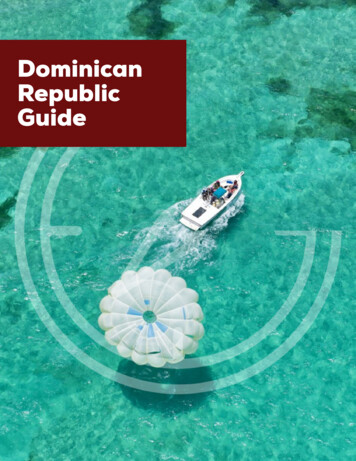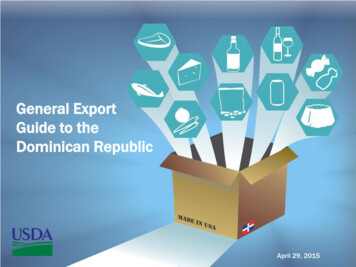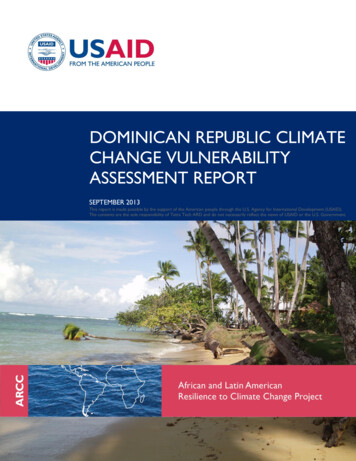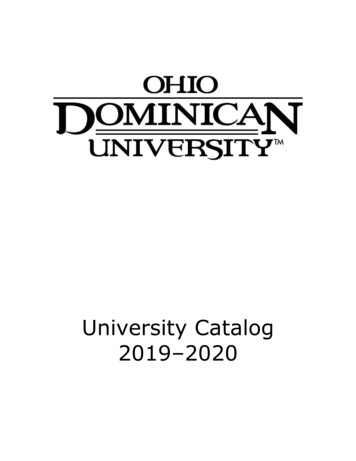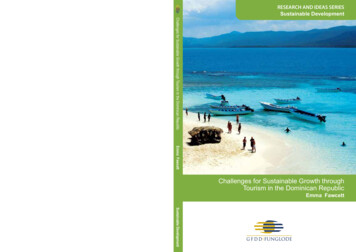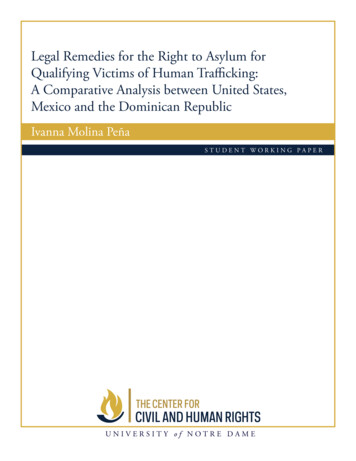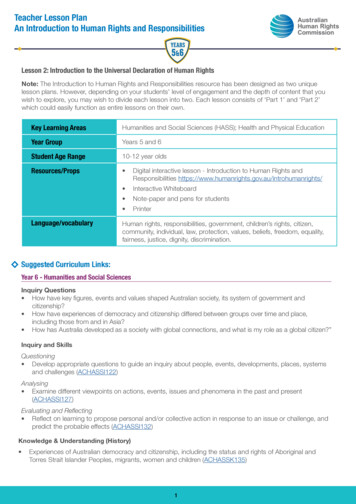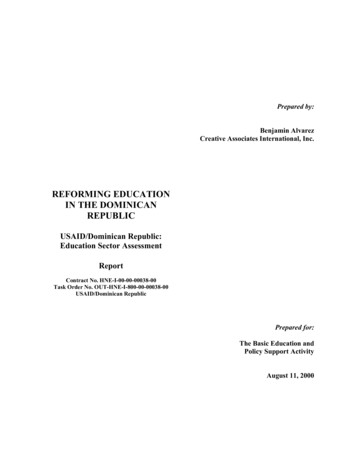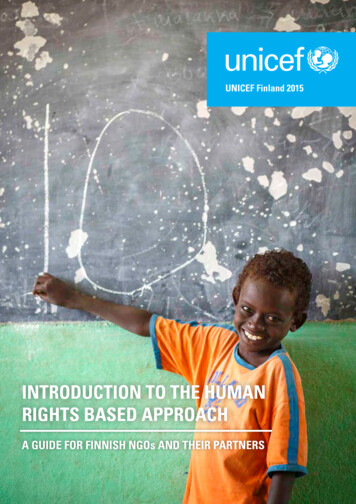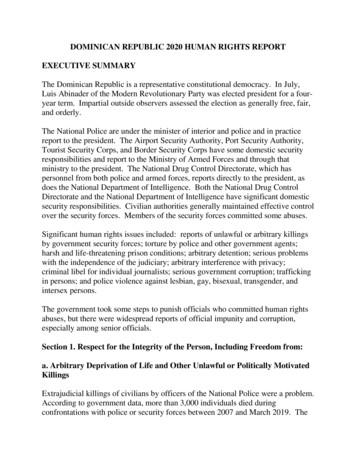
Transcription
DOMINICAN REPUBLIC 2020 HUMAN RIGHTS REPORTEXECUTIVE SUMMARYThe Dominican Republic is a representative constitutional democracy. In July,Luis Abinader of the Modern Revolutionary Party was elected president for a fouryear term. Impartial outside observers assessed the election as generally free, fair,and orderly.The National Police are under the minister of interior and police and in practicereport to the president. The Airport Security Authority, Port Security Authority,Tourist Security Corps, and Border Security Corps have some domestic securityresponsibilities and report to the Ministry of Armed Forces and through thatministry to the president. The National Drug Control Directorate, which haspersonnel from both police and armed forces, reports directly to the president, asdoes the National Department of Intelligence. Both the National Drug ControlDirectorate and the National Department of Intelligence have significant domesticsecurity responsibilities. Civilian authorities generally maintained effective controlover the security forces. Members of the security forces committed some abuses.Significant human rights issues included: reports of unlawful or arbitrary killingsby government security forces; torture by police and other government agents;harsh and life-threatening prison conditions; arbitrary detention; serious problemswith the independence of the judiciary; arbitrary interference with privacy;criminal libel for individual journalists; serious government corruption; traffickingin persons; and police violence against lesbian, gay, bisexual, transgender, andintersex persons.The government took some steps to punish officials who committed human rightsabuses, but there were widespread reports of official impunity and corruption,especially among senior officials.Section 1. Respect for the Integrity of the Person, Including Freedom from:a. Arbitrary Deprivation of Life and Other Unlawful or Politically MotivatedKillingsExtrajudicial killings of civilians by officers of the National Police were a problem.According to government data, more than 3,000 individuals died duringconfrontations with police or security forces between 2007 and March 2019. The
DOMINICAN REPUBLIC2exact number of extrajudicial killings was unknown. The Internal Affairs Unitinvestigates charges of gross misconduct by members of the National Police,including killings. Separately, the district attorney has authority to investigate andprosecute criminal misconduct by members of the National Police. Thegovernment stated it was unaware of any extrajudicial killings during the year andadded that any such cases would be investigated for possible prosecution. Mediaand civil society acknowledged that many cases went unreported due to a lack offaith in the justice system to pursue charges.The National Human Rights Commission (NHRC), a nongovernmentalorganization (NGO), reported on extrajudicial killings by police, with several tiedto the nightly curfew imposed by the government in response to the COVID-19pandemic. Unlike in previous years, the NHRC did not report detailed statistics onextrajudicial killings by the national police. The NHRC did, however, highlightseveral troubling incidents of individuals killed or injured by police for apparentcurfew violations. In September a motorcycle police officer shot two personsriding a motorcycle after curfew in Santo Domingo. In April an 11-year-oldbystander was killed in her home during a shootout between police and individualsout in violation of the curfew.b. DisappearanceThere were no reports of disappearances by or on behalf of government authorities.c. Torture and Other Cruel, Inhuman, or Degrading Treatment orPunishmentAlthough the law prohibits torture, beating, and physical abuse, there were reportsthat security force members, primarily police, carried out such practices.In May sex workers in Santo Domingo reported to news outlets that police officersroutinely beat them as the sex workers attempted to work in violation of COVID19 prohibitions.Impunity was a problem within certain units of the security forces, particularly thenational police. The government largely failed to respond to questions regardinginternal controls and investigations among the security forces. Through September1, the government reported a single instance of excessive force by a police officer.It further claimed that all arrests complied with constitutional protections. TheCountry Reports on Human Rights Practices for 2020United States Department of State Bureau of Democracy, Human Rights, and Labor
DOMINICAN REPUBLIC3government used training to combat official impunity. The national police offeredspecialized training on human rights as part of their continuing education courses.Prison and Detention Center ConditionsPrison conditions ranged from general compliance with international standards in“new-model” prisons (correctional rehabilitation centers, or CRCs) to harsh andlife threatening in “old-model” prisons.Physical Conditions: Gross overcrowding was a problem in old-model prisons.The Directorate of Prisons reported that as of September there were 16,614prisoners in old-model prisons and 9,986 in CRCs. This ratio remained constantfor the past several years because old-model prisons were not phased out. LaVictoria, the oldest prison, held 7,236 inmates, although it was designed for amaximum capacity of 2,011. The inmate population at every old-model prisonexceeded capacity, while only one of the 22 CRCs was over capacity.Police and military inmates received preferential treatment and were held in theirown separate facilities, as were prisoners with the financial means to rentpreferential bed space and purchase other necessities in old-model prisons.According to the Directorate of Prisons, military and police personnel guarded oldmodel prisons, while a trained civilian corps guarded CRCs. Reports ofmistreatment and violence in old-model prisons were common, as were reports ofharassment, extortion, and inappropriate searches of prison visitors. Some oldmodel prisons remained effectively outside the control of authorities, and therewere reports of drug trafficking, arms trafficking, prostitution, and sexual abuse inthose prisons. Wardens at old-model prisons often controlled only the perimeter,while inmates controlled the inside with their own rules and system of justice.Although the law mandates separation of prisoners according to severity ofoffense, authorities did not do so.In August a journalist released an investigative report showing overt corruptionand drug trafficking in La Victoria Prison. Posing as an inmate, he used a hiddencamera to record police and prison leadership collecting bribes weekly frominmates. His recordings also showed how guards allowed drugs to be traffickedthrough the prison. In response to the report, the government dismissed 18officials, including the warden, certain administrative personnel, and the policeofficers in charge.Country Reports on Human Rights Practices for 2020United States Department of State Bureau of Democracy, Human Rights, and Labor
DOMINICAN REPUBLIC4In old-model prisons, health and sanitary conditions were generally inadequate.Prisoners often slept on the floor because no beds were available. Prison officialsdid not separate sick inmates. After a series of complaints, authorities transferredprisoners with COVID-19 symptoms to separate facilities for treatment. Delays inreceiving medical attention were common in both the old-model prisons andCRCs.All prisons had infirmaries, but most infirmaries did not meet the needs of theprison population. In most cases inmates had to purchase their own medications orrely on family members or outside associates to provide medications. Illness wasthe primary cause of deaths reported in the prison system. According to theDirectorate of Prisons, all prisons provided treatment for HIV and AIDS, but theNHRC stated that none of the old-model prisons was properly equipped to providesuch treatment. As of September more than 900 prisoners had contracted COVID19, resulting in 17 deaths.In CRCs and certain old-model prisons, a subset of the prison population withmental disabilities received treatment, including therapy, for their conditions. Inmost old-model prisons, however, the government did not provide services toprisoners with mental disabilities. In general the mental-health services providedto prisoners were inadequate or inconsistent with prisoners’ needs.The government reported it had installed wheelchair ramps in some prisons forprisoners with physical disabilities. NGOs claimed the majority of prisons still didnot provide access for inmates with disabilities.Administration: Authorities investigated credible allegations of mistreatment.Independent Monitoring: The government permitted visits to and monitoring ofprisons by independently funded and operated nongovernmental observers,international organizations, and media. The NHRC, National Office of PublicDefense (NOPD), Attorney General’s Office, and CRC prison administrationtogether created human rights committees in each CRC that were authorized toconduct surprise visits. In October the NHRC opened a permanent office in thecountry’s largest prison. Access to migrant detention centers for monitoring,however, was not systematically granted to human rights organizations.Improvements: In August the government inaugurated the New Victoria prison, alarge CRC scheduled to replace the overcrowded Victoria prison. As of SeptemberCountry Reports on Human Rights Practices for 2020United States Department of State Bureau of Democracy, Human Rights, and Labor
DOMINICAN REPUBLIC5the transfer of prisoners from the old Victoria prison to the New Victoria prisonhad not begun.d. Arbitrary Arrest or DetentionThe constitution prohibits detention without a warrant unless authorities apprehenda suspect during the commission of a crime or in other special circumstances. Thelaw permits detention without a charge for up to 48 hours. The constitutionprovides for the right of any person to challenge the lawfulness of his or herdetention in court, and the government generally observed this requirement.Arbitrary arrest and detention were problems. There were reports of individualsheld and later released with little or no explanation for the detention. NGOsreported detainees were often taken into custody at the scene of a crime or duringdrug raids. In many instances authorities fingerprinted, questioned, and thenreleased those detainees.Arrest Procedures and Treatment of DetaineesThe law provides that an accused person may be detained for up to 48 hourswithout a warrant before being presented to judicial authorities. Nonetheless, therewere reports of detainees who remained in police stations for long periods of time,even weeks, before being transferred to a prison. Police stations did not haveadequate physical conditions or the resources, including food, to provide fordetainees for an extended period.The law permits police to apprehend without an arrest warrant any person caughtin the act of committing a crime or reasonably linked to a crime, such as casesinvolving hot pursuit or escaped prisoners. Police sometimes detained suspects forinvestigation or interrogation longer than 48 hours. Police often detained allsuspects and witnesses to a crime. Successful habeas corpus hearings reducedabuses of the law significantly. There was a functioning bail system and a systemof house arrest.The law requires provision of counsel to indigent defendants, but staffing levelswere inadequate to meet demand. In theory the NOPD provided free legal aid tothose who could not afford counsel, but many detainees and prisoners who couldnot afford private counsel did not have prompt access to a lawyer due toinadequate staffing. Prosecutors and judges handled interrogations of juveniles,since the law prohibits interrogation of juveniles by or in the presence of police.Country Reports on Human Rights Practices for 2020United States Department of State Bureau of Democracy, Human Rights, and Labor
DOMINICAN REPUBLIC6Arbitrary Arrest: Police made sporadic sweeps or roundups in low-income, highcrime communities during which they arrested and detained individuals withoutwarrants. During these operations police detained large numbers of residents andseized personal property allegedly used in criminal activity.The International Organization for Migration (IOM) reported cases of Haitianmigrants and their children, as well as Dominicans of Haitian descent, beingdetained and deported because authorities did not permit them to retrieveimmigration or citizenship documents from their residences. There were alsoreports of deportations of unaccompanied children and of women who left childrenbehind. The IOM reported that due to training they provided to migration officials,the number of erroneous deportations of documented and vulnerable persons fellby 58 percent over the past four years.Civil society organization representatives said the government informally deportedindividuals by taking them across the border without documentation. The IOMreported that the General Directorate of Migration referred to these cases as“devolutions” or “not admitted” and that there was no due process in theseoperations. The IOM worked with the government to establish a system fornonadmitted persons.Pretrial Detention: Many suspects endured long pretrial detention. A judge mayorder detention between three and 18 months. According to the Directorate ofPrisons, as of September, 62 percent of inmates in old-model prisons were inpretrial custody, compared with 53 percent of prisoners in CRCs. The averagepretrial detention time was three months, but there were reports of pretrialdetention lasting more than three years, including cases involving foreign citizens.Time served in pretrial detention counted toward completing a sentence.The failure of prison authorities to produce detainees for court hearings causedsome trial postponements. Many inmates had their court dates postponed due to alack of transportation from prison to court. In other cases their lawyer,codefendants, interpreters, or witnesses did not appear or were not officially calledby the court to appear. Despite protections for defendants in the law, in some casesauthorities held inmates beyond the legally mandated deadlines, even when therewere no formal charges against them.e. Denial of Fair Public TrialCountry Reports on Human Rights Practices for 2020United States Department of State Bureau of Democracy, Human Rights, and Labor
DOMINICAN REPUBLIC7The law provides for an independent judiciary; however, the government did notrespect judicial independence and impartiality. Improper influence on judicialdecisions was widespread. Interference ranged from selective prosecution todismissal of cases amid allegations of bribery or undue political pressure. Thejudiciary routinely dismissed high-level corruption cases. The NOPD reported themost frequent form of interference with judicial orders occurred when authoritiesrefused to accept writs of habeas corpus to release detainees. Corruption of thejudiciary was a serious problem.Trial ProceduresThe law provides for the right to a defense in a fair and public trial; however, thejudiciary did not always enforce this right. The courts sometimes exceeded themaximum period of time established by the law for setting hearing dates.The law provides for a presumption of innocence. The District Attorney’s Officeis required to notify defendants and their attorneys of criminal charges.Defendants have the right to be present at their trial and to consult with an attorneyin a timely manner. The indigent have the right to a public defender, but thedirector of the NOPD stated the number of public defenders was insufficient.Defendants have the right to adequate time and facilities to prepare a defense. Thelaw provides for free interpretation as necessary. The law provides for the right toconfront or question witnesses and the right against self-incrimination. Defendantshave the right to present their own witnesses and evidence. The constitutionprovides for the right to appeal and prohibits higher courts from increasing thesentences of lower courts.Military and police tribunals share jurisdiction over disciplinary cases involvingmembers of the security forces. Military tribunals have jurisdiction over casesinvolving violations of military rules and regulations. Civilian criminal courtshandle cases of killings and other serious crimes allegedly committed by membersof the security forces.Political Prisoners and DetaineesThere were no reports of political prisoners or detainees.Civil Judicial Procedures and RemediesCountry Reports on Human Rights Practices for 2020United States Department of State Bureau of Democracy, Human Rights, and Labor
DOMINICAN REPUBLIC8There are separate court systems for criminal law, commercial law, civil law, laborlaw, real estate law, and administrative law. Commercial and civil courtsreportedly had lengthy delays in adjudicating cases, although their ultimatedecisions were generally enforced. As in criminal courts, undue political andeconomic influence in civil court decisions was a problem.Citizens have recourse to file an amparo, an action to seek redress of any violationof a constitutional right, including violations of fundamental rights.f. Arbitrary or Unlawful Interference with Privacy, Family, Home, orCorrespondenceThe law prohibits arbitrary entry into a private residence, except when police are inhot pursuit of a suspect, a suspect is caught in the act of committing a crime, orpolice suspect a life is in danger. The law provides that all other entries into aprivate residence require an arrest or search warrant issued by a judge. Despitethese limits on government authority, police conducted illegal searches andseizures, including many raids without warrants on private residences in poorneighborhoods.During the months leading up to the national elections in July, human rightsgroups, opposition politicians, and journalists critical of the government allegedthat the Medina administration used unauthorized wiretaps, monitored privateemail, and used other surreptitious methods to interfere with the private lives ofindividuals and families. The Medina administration denied this. Oppositionpolitical parties alleged that Medina administration officials at times threatenedsubordinates with loss of employment or offered benefits to compel them tosupport Dominican Liberation Party candidates.Section 2. Respect for Civil Liberties, Including:a. Freedom of Expression, Including for the PressThe constitution provides for freedom of expression, including for the press, andthe government generally respected this right. Media expressed a wide variety ofviews, but the government frequently influenced the press, in part through its largeadvertising budgets. The concentration of media ownership, weaknesses in thejudiciary, and political influence also limited media’s independence.Country Reports on Human Rights Practices for 2020United States Department of State Bureau of Democracy, Human Rights, and Labor
DOMINICAN REPUBLIC9Freedom of Speech: Individuals and groups were generally able to criticize thegovernment publicly and privately without reprisal, although there were severalincidents in which authorities intimidated members of the press. In September thenew administration allegedly violated freedom of expression when it dismissed agovernment whistleblower within the Ministry of Culture after she informed mediaof the allegedly arbitrary dismissal of several civil service staff within the ministry.The Ministry of Culture never directly addressed or explained these dismissals.In another instance several media outlets reported that press was granted onlylimited access to public government events. Media outlets with reporters assignedto the national palace stated they were not informed on time nor given access topublic meetings held by the president or his cabinet members. When pressrepresentatives requested an explanation for these actions, they were told theevents were private. Media also highlighted a lack of coordination by the palacecommunication team in providing the president’s public schedule and conveningmedia to cover meetings. The Abinader administration’s communication team metjournalists to hear their complaints and find a solution.Freedom of Press and Media, Including Online Media: The DominicanAssociation of Journalists reported at the start of the national COVID-19 lockdownthat several journalists from the provinces of Santiago, Bahoruco, Mao, and SantoDomingo were stopped or prevented from transiting freely to report on thepandemic. The association requested the government to instruct police andmilitary officers that journalists were essential workers who could transit aftercurfew and to avoid any aggression towards them. The government did not makeany statement in response to this complaint, but it provided curfew passes forvarious kinds of workers, including media members, and cases decreased ofsecurity forces restricting the movement of journalists. The InternationalFederation of Journalists reported an alleged beating by police officers of a radiojournalist who protested for the freedom of a colleague who had allegedly violatedthe curfew in the province of San Pedro de Macoris. In November the DominicanAssociation of Journalists announced it would provide stickers and license platesfrom the organization to identify their members and facilitate identification ofjournalists by law enforcement.Violence and Harassment: Journalists and other persons who worked in mediawere occasionally harassed or physically attacked. Some media outlets reportedthat journalists, specifically in rural areas, received threats for investigating ordenouncing criminal groups and official corruption. Some media outlets omittedCountry Reports on Human Rights Practices for 2020United States Department of State Bureau of Democracy, Human Rights, and Labor
DOMINICAN REPUBLIC10the bylines of journalists reporting on drug trafficking and other security matters toprotect the individual journalists.Censorship or Content Restrictions: The constitution provides for protection of theconfidentiality of journalists’ sources and includes a “conscience clause” allowingjournalists to refuse reporting assignments. Journalists practiced self-censorship,particularly when coverage could adversely affect the economic or politicalinterests of media owners. Observers suggested the government influenced thepress through advertising contracts. In July during the presidential transitionperiod, the government’s communications directorate published expense reportsfor the outgoing administration. Journalists and observers criticized governmentspending on advertisements, which according to official figures reachedapproximately 18.5 million over eight years, describing it as a strategy toinfluence journalists’ speech.Libel/Slander Laws: The law criminalizes defamation and insult, with harsherpunishment for offenses committed against public or state figures than for offensesagainst private individuals. The Dominican Association of Journalists reportedthat journalists were sued by politicians, government officials, and the privatesector to pressure them to stop reporting. The law penalizes libel for statementsconcerning the private lives of certain public figures, including governmentofficials and foreign heads of state.In December 2019 the former attorney general’s sister sued a well knownjournalist for slander after his investigative report alleged that she received no-bidgovernment contracts worth 750 million pesos ( 13 million), positioning thecompany she represented as the sole supplier of asphalt products to thegovernment. The journalist demonstrated that at the time the contracts weresigned, the sister was a paid employee of the Ministry of Public Works andCommunications. Several preliminary hearings took place during the followingmonths with limited press access, but the trial did not formally start due toCOVID-19 restrictions. The lawsuit was withdrawn on August 13, three daysbefore the new administration took office.In February the Supreme Court upheld a guilty verdict for libel and defamationagainst a television and online journalist in a case brought by the former presidentof the lower house of congress. Although it affirmed the verdict, the SupremeCourt reduced the damage award from approximately 120,000 to 85,000. Theplaintiff, who was the sister of former president Danilo Medina, filed the lawsuit inCountry Reports on Human Rights Practices for 2020United States Department of State Bureau of Democracy, Human Rights, and Labor
DOMINICAN REPUBLIC112017 alleging the defendant had impugned her honor by insinuating she wasinvolved in a romantic relationship with the former head of the national police.Internet FreedomThe government did not restrict or disrupt access to the internet or censor onlinecontent without appropriate legal authority; however, there were allegations thegovernment monitored private online communications without appropriate legalauthority.Academic Freedom and Cultural EventsThere were no government restrictions on academic freedom or cultural events.b. Freedoms of Peaceful Assembly and AssociationThe law provides for the freedoms of peaceful assembly and association, and thegovernment generally respected these rights.In June, Afro-Dominican and nationalist groups clashed at a Santo Domingo vigilorganized in solidarity with worldwide Black Lives Matter protests. Policedispersed the crowd and arrested organizers of both groups for violatinggovernment restrictions on public events during the coronavirus pandemic. Civilsociety observers denounced perceived unequal treatment during the arrests,stating police treated the Afro-Dominican leaders more roughly. The head of theattorney general’s Human Rights Office intervened to ensure the quick release ofleaders from both groups and no charges were filed.c. Freedom of ReligionSee the Department of State’s International Religious Freedom Report athttps://www.state.gov/religiousfreedomreport/.d. Freedom of MovementThe law provides for freedom of internal movement, foreign travel, emigration,and repatriation, and the government generally respected these rights, with someexceptions.Country Reports on Human Rights Practices for 2020United States Department of State Bureau of Democracy, Human Rights, and Labor
DOMINICAN REPUBLIC12In-country Movement: Civil society representatives reported that citizens ofHaitian descent, those perceived to be Haitian, and Haitian migrants facedobstacles while traveling within the country. NGO representatives reported thatsecurity forces at times asked travelers to show immigration and citizenshipdocuments at road checkpoints throughout the country. Citizens of Haitian descentand migrants without valid identity documents reported fear of swift deportationwhen traveling within the country, especially near the border with Haiti (see alsosection 1.d.).e. Status and Treatment of Internally Displaced PersonsNot applicable.f. Protection of RefugeesThe government cooperated in a limited manner with the Office of the UN HighCommissioner for Refugees (UNHCR) and other humanitarian organizations inproviding protection and assistance to refugees, asylum seekers, stateless persons,and other persons of concern.Government officials reported 14,050 Venezuelans migrants, of whom 60 percenthad expired documentation, registered under a temporary status with thegovernment. The government and NGOs estimated an additional 100,000Venezuelans lived in the country in an irregular migration status. In December2019 the government instituted a regulation requiring Venezuelans to apply for atourist visa before entering the country. Previously, Venezuelans needed only avalid passport and could receive a tourist visa at the point of entry. ManyVenezuelans resident in the country entered legally before the new regulation andstayed longer than the three-month allowance.The government did not issue guidelines to facilitate the regularization of status forVenezuelans living in the country. The inability to apply for in-country adjustmentof status hindered Venezuelans’ access to basic services and increased theirvulnerability to labor exploitation and trafficking. Venezuelan refugee andimmigrant associations, with the support of the IOM, UNHCR, and CoordinationPlatform for Refugees and Migrants from Venezuela (R4V Platform), coordinatedwith the government and civil society organizations to provide public-health andlegal services for Venezuelan refugees and migrants. The R4V Platform is aregional interagency platform, led by IOM and UNHCR, for coordinating thehumanitarian response for refugees and migrants from Venezuela.Country Reports on Human Rights Practices for 2020United States Department of State Bureau of Democracy, Human Rights, and Labor
DOMINICAN REPUBLIC13Refoulement: There were reports of persons potentially in need of internationalprotection being denied admission at the point of entry and subsequently beingdeported to their countries of origin without being granted access to the asylumprocess (see also section 1.d.).Access to Asylum: Presidential decrees from the 1980s established a system forgranting asylum or refugee status; however, the system was not implementedthrough legislation and regulations. The constitution prohibits administrativedetention for asylum seekers, and the law establishes that asylum seekers shouldnot be detained under any circumstance. The system for providing protection torefugees was not effectively implemented. The government recognized and issuedidentity documents to very few refugees during the past few years. Rejection ratesfor asylum claim
DOMINICAN REPUBLIC 4 Country Reports on Human Rights Practices for 2020 United States Department of State Bureau of Democracy, Human Rights, and Labor In old-model prisons, health and sanitary conditions were generally inadequate. Prisoners often slept on the floor because no beds were available. Prison officials did not separate sick inmates.
